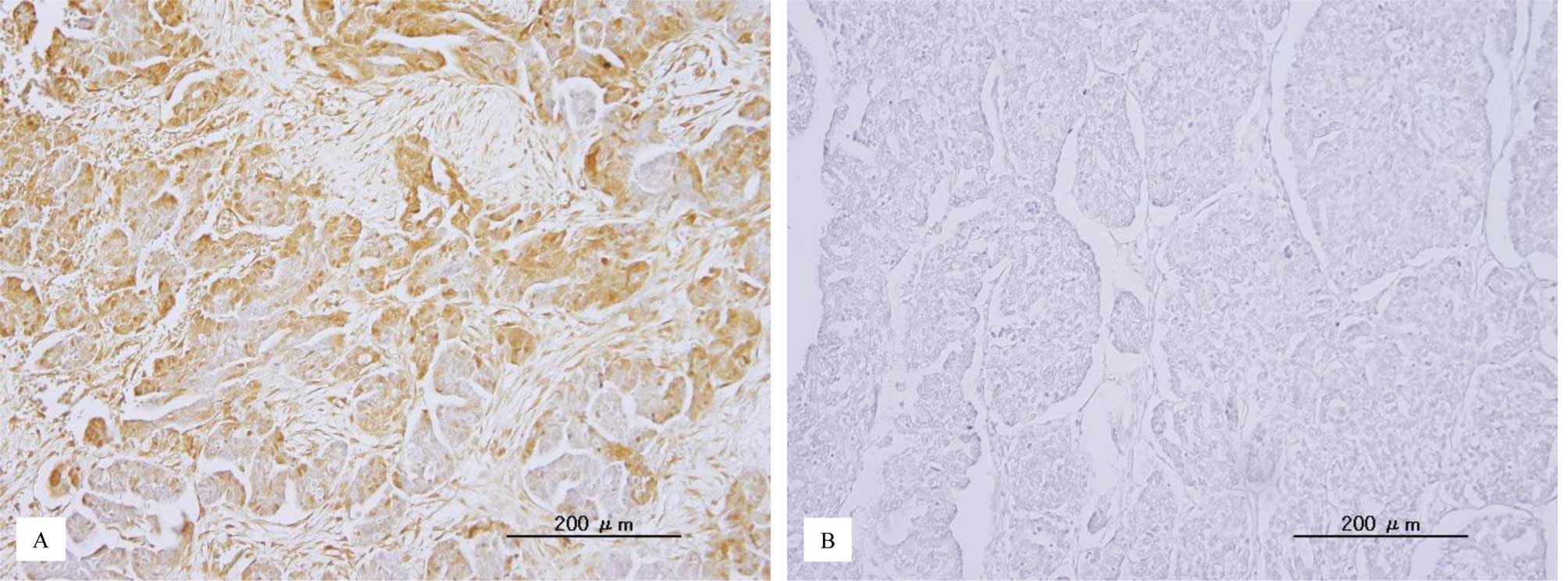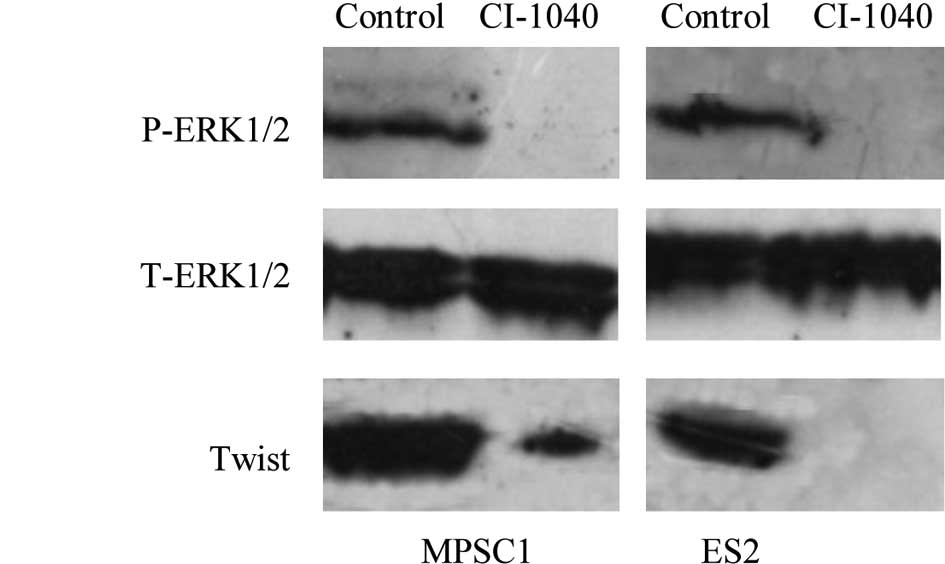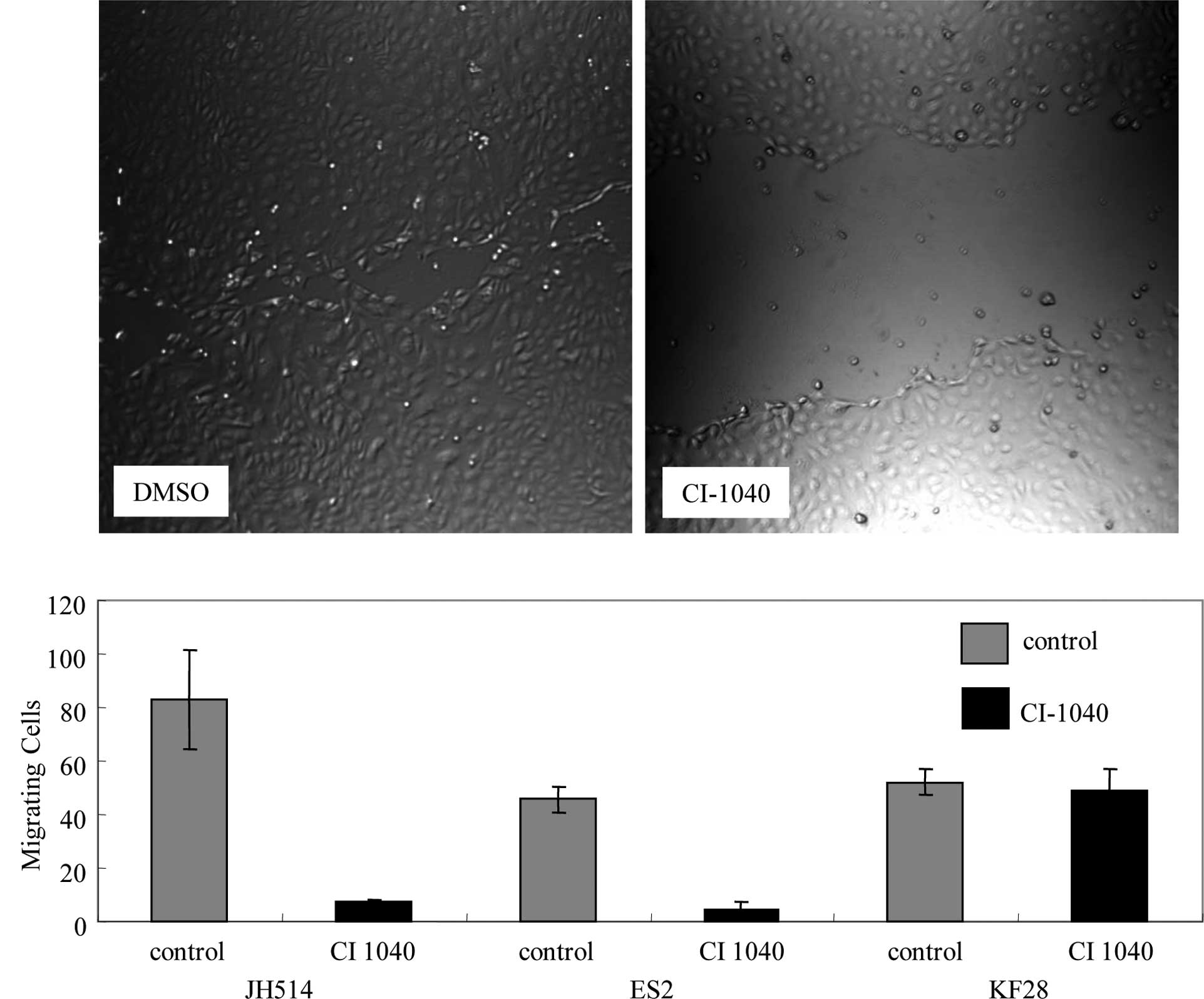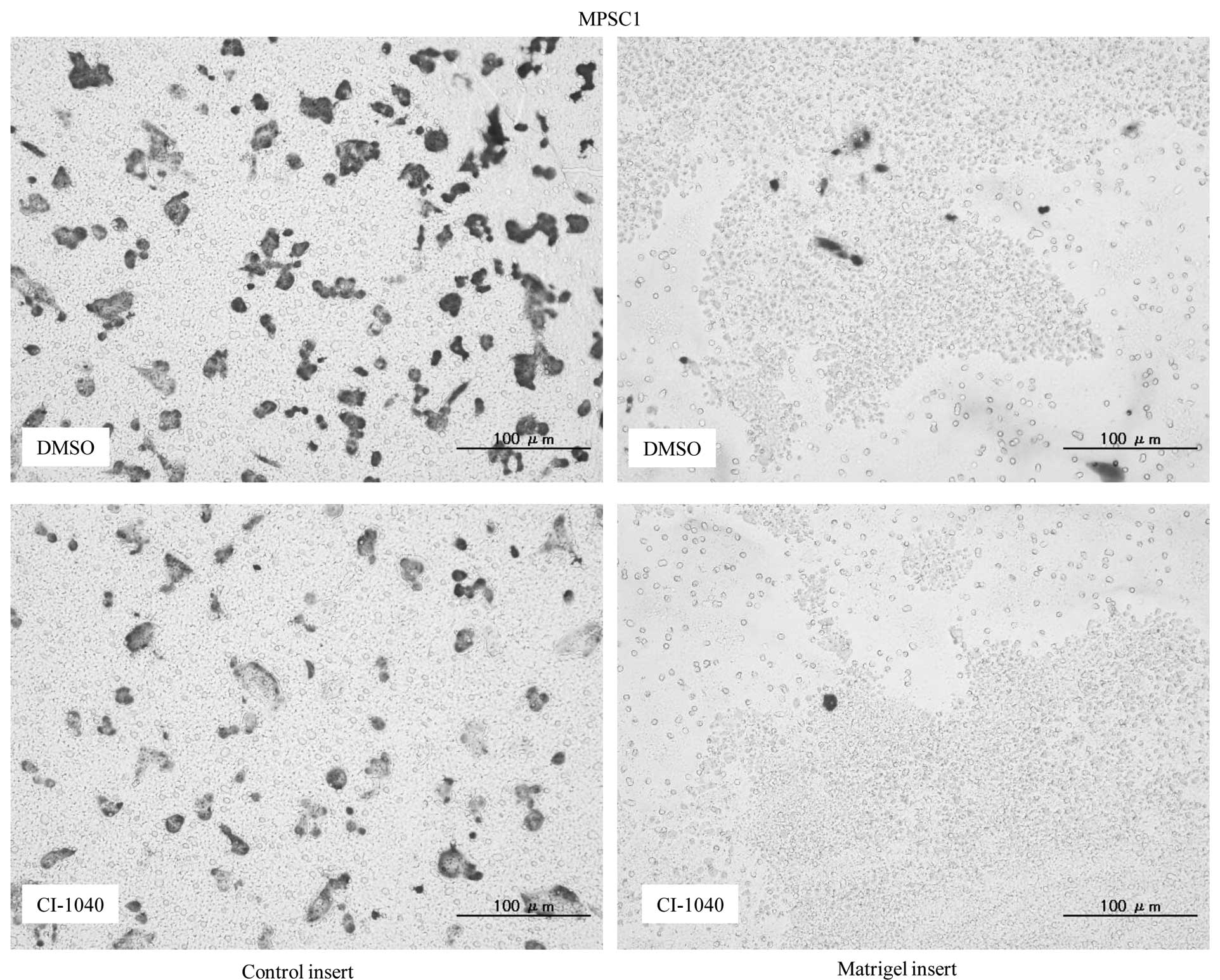|
1.
|
Wingo PA, Tong T and Bolden S: Cancer
statistics, 1995. CA Cancer J Clin. 45:8–30. 1995. View Article : Google Scholar
|
|
2.
|
Faleiro-Rodrigues C, Macedo-Pinto I,
Pereira D and Lopes CS: Prognostic value of E-cadherin
immunoexpression in patients with primary ovarian carcinomas. Ann
Oncol. 15:1535–1542. 2004. View Article : Google Scholar : PubMed/NCBI
|
|
3.
|
Singer G, Oldt R III, Cohen Y, et al:
Mutations in BRAF and KRAS characterize the development of
low-grade ovarian serous carcinoma. J Natl Cancer Inst. 95:484–486.
2003. View Article : Google Scholar : PubMed/NCBI
|
|
4.
|
Nakayama K, Nakayama N, Kurman RJ, et al:
Sequence mutations and amplification of PIK3CA and AKT2 genes in
purified ovarian serous neoplasms. Cancer Biol Ther. 5:779–785.
2006. View Article : Google Scholar : PubMed/NCBI
|
|
5.
|
Wan PT, Garnett MJ, Roe S, et al:
Mechanism of activation of the RAF-ERK signaling pathway by
oncogenic mutations of B-RAF. Cell. 116:855–867. 2004. View Article : Google Scholar : PubMed/NCBI
|
|
6.
|
Olson JM and Hallahan AR: p38 MAP kinase:
a convergence point in cancer therapy. Trends Mol Med. 10:125–129.
2004. View Article : Google Scholar : PubMed/NCBI
|
|
7.
|
Hsu CY, Bristow R, Cha MS, et al:
Characterization of active mitogen-activated protein kinase in
ovarian serous carcinomas. Clin Cancer Res. 10:6432–6436. 2004.
View Article : Google Scholar : PubMed/NCBI
|
|
8.
|
Peyssonnaux C and Eychene A: The
Raf/MEK/ERK pathway: new concepts of activation. Biol Cell.
93:53–62. 2001. View Article : Google Scholar : PubMed/NCBI
|
|
9.
|
Allen LF, Sebolt-Leopold J and Meyer MB:
CI-1040 (PD184352), a targeted signal transduction inhibitor of MEK
(MAPKK). Semin Oncol. 30:105–116. 2003. View Article : Google Scholar : PubMed/NCBI
|
|
10.
|
Yamamoto K, Kikuchi Y, Kudoh K and Nagata
I: Modulation of cisplatin sensitivity by taxol in
cisplatin-sensitive and -resistant human ovarian carcinoma cell
lines. J Cancer Res Clin Oncol. 126:168–172. 2000. View Article : Google Scholar : PubMed/NCBI
|
|
11.
|
Holmstrom TH, Tran SE, Johnson VL, et al:
Inhibition of mitogen-activated kinase signaling sensitizes HeLa
cells to Fas receptor-mediated apoptosis. Mol Cell Biol.
19:5991–6002. 1999.PubMed/NCBI
|
|
12.
|
Cowley GP and Smith ME: Modulation of
E-cadherin expression and morphological phenotype in the
intravascular component of adenocarcinomas. Int J Cancer.
60:325–329. 1995. View Article : Google Scholar : PubMed/NCBI
|
|
13.
|
Huang C, Jacobson K and Schaller MD: MAP
kinases and cell migration. J Cell Sci. 117:4619–4628. 2004.
View Article : Google Scholar : PubMed/NCBI
|
|
14.
|
Mansour SJ, Matten WT, Hermann AS, et al:
Transformation of mammalian cells by constitutively active MAP
kinase kinase. Science. 265:966–970. 1994. View Article : Google Scholar : PubMed/NCBI
|
|
15.
|
Mansour SJ, Resing KA, Candi JM, et al:
Mitogen-activated protein (MAP) kinase phosphorylation of MAP
kinase kinase: determination of phosphorylation sites by mass
spectrometry and site-directed mutagenesis. J Biochem. 116:304–314.
1994.
|
|
16.
|
Anand-Apte B, Zetter BR, Viswanathan A, et
al: Platelet-derived growth factor and fibronectin-stimulated
migration are differentially regulated by the Rac and extracellular
signal-regulated kinase pathways. J Biol Chem. 272:30688–30692.
1997. View Article : Google Scholar
|
|
17.
|
Klemke RL, Cai S, Giannini AL, et al:
Regulation of cell motility by mitogen-activated protein kinase. J
Cell Biol. 137:481–492. 1997. View Article : Google Scholar : PubMed/NCBI
|
|
18.
|
Webb DJ, Donais K, Whitmore LA, et al:
FAK-Src signalling through paxillin, ERK and MLCK regulates
adhesion disassembly. Nat Cell Biol. 6:154–161. 2004. View Article : Google Scholar : PubMed/NCBI
|
|
19.
|
Cheresh DA, Leng J and Klemke RL:
Regulation of cell contraction and membrane ruffling by distinct
signals in migratory cells. J Cell Biol. 146:1107–1116. 1999.
View Article : Google Scholar : PubMed/NCBI
|
|
20.
|
Lai CF, Chaudhary L, Fausto A, et al: Erk
is essential for growth, differentiation, integrin expression, and
cell function in human osteoblastic cells. J Biol Chem.
276:14443–14450. 2001.PubMed/NCBI
|
|
21.
|
Mao TL, Seidman JD, Kurman RJ and Shih IM:
Cyclin E and p16 immunoreactivity in epithelioid trophoblastic
tumor – an aid in differential diagnosis. Am J Surg Pathol.
30:1105–1110. 2006.PubMed/NCBI
|
|
22.
|
Mizumoto Y, Kyo S, Mori N, et al:
Activation of ERK1/2 occurs independently of KRAS or BRAF status in
endometrial cancer and is associated with favorable prognosis.
Cancer Sci. 98:652–658. 2007. View Article : Google Scholar : PubMed/NCBI
|
|
23.
|
Nakayama N, Nakayama K, Yeasmin S, et al:
KRAS or BRAF mutation status is a useful predictor of sensitivity
to MEK inhibition in ovarian cancer. Br J Cancer. 99:2020–2028.
2008. View Article : Google Scholar : PubMed/NCBI
|
|
24.
|
Kang Y and Massague J:
Epithelial-mesenchymal transitions: twist in development and
metastasis. Cell. 118:277–279. 2004. View Article : Google Scholar : PubMed/NCBI
|
|
25.
|
Terauchi M, Kajiyama H, Yamashita M, et
al: Possible involvement of TWIST in enhanced peritoneal metastasis
of epithelial ovarian carcinoma. Clin Exp Metastasis. 24:329–339.
2007. View Article : Google Scholar : PubMed/NCBI
|
|
26.
|
Niu RF, Zhang L, Xi GM, et al:
Up-regulation of Twist induces angiogenesis and correlates with
metastasis in hepatocellular carcinoma. J Exp Clin Cancer Res.
26:385–394. 2007.PubMed/NCBI
|
|
27.
|
Mironchik Y, Winnard PT, Vesuna F, et al:
Twist overexpression induces in vivo angiogenesis and correlates
with chromosomal instability in breast cancer. Cancer Res.
65:10801–10809. 2005. View Article : Google Scholar : PubMed/NCBI
|
|
28.
|
Maestro R, Dei Tos AP, Hamamori Y, et al:
Twist is a potential oncogene that inhibits apoptosis. Genes Dev.
13:2207–2217. 1999. View Article : Google Scholar : PubMed/NCBI
|
|
29.
|
Chou FL, Hill JM, Hsieh JC, et al: PEA-15
binding to ERK1/2 MAPKs is required for its modulation of integrin
activation. J Biol Chem. 278:52587–52597. 2003. View Article : Google Scholar : PubMed/NCBI
|
|
30.
|
Kurata H, Thant AA, Matsuo S, et al:
Constitutive activation of MAP kinase kinase (MEK1) is critical and
sufficient for the activation of MMP-2. Exp Cell Res. 254:180–188.
2000. View Article : Google Scholar : PubMed/NCBI
|
|
31.
|
Webb DJ, Nguyen DH and Gonias SL:
Extracellular signal-regulated kinase functions in the urokinase
receptor-dependent pathway by which neutralization of low density
lipoprotein receptor-related protein promotes fibrosarcoma cell
migration and Matrigel invasion. J Cell Sci. 113:123–134. 2000.
|
|
32.
|
Takino T, Miyamori H, Watanabe Y, et al:
Membrane type 1 matrix metalloproteinase regulates
collagen-dependent mitogen-activated protein/extracellular
signal-related kinase activation and cell migration. Cancer Res.
64:1044–1049. 2004. View Article : Google Scholar
|
|
33.
|
Tanigawara Y, Kita T, Hirono M, et al:
Identification of N-acetyltransferase 2 and CYP2C19 genotypes for
hair, buccal cell swabs, or fingernails compared with blood. Ther
Drug Monit. 23:341–346. 2001. View Article : Google Scholar : PubMed/NCBI
|
|
34.
|
Sebolt-Leopold JS, Dudley DT, Herrera R,
et al: Blockade of the MAP kinase pathway suppresses growth of
colon tumors in vivo. Nat Med. 5:810–816. 1999. View Article : Google Scholar : PubMed/NCBI
|
|
35.
|
Arteaga CL and Baselga J: Tyrosine kinase
inhibitors: Why does the current process of clinical development
not apply to them? Cancer Cell. 5:525–531. 2004. View Article : Google Scholar : PubMed/NCBI
|
|
36.
|
Rinehart J, Adjei AA, Lorusso PM, et al:
Multicenter phase II study of the oral MEK inhibitor, CI-1040, in
patients with advanced non-small-cell lung, breast, colon and
pancreatic cancer. J Clin Oncol. 22:4456–4462. 2004. View Article : Google Scholar : PubMed/NCBI
|



















